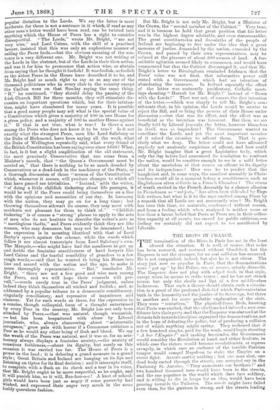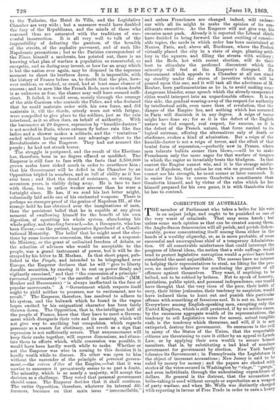THE RIOTS IN FRANCE. THE RIOTS IN FRANCE.
THE termination of the Riots in Paris has not in the least altered the situation. It is well, of course, that order has been restored, and restored without bloodshed, but the Emperor is not the stronger, for no real collision has occurred. He is not vanquished, indeed, hut also he is not victor. The story just now so popular in Paris, that the demonstrations were "got up " by the Police, we, of course, utterly discredit. The Emperor does not play with edged tools in that style, except when he means to strike terror ; and he has not struck terror, but only the skulls and lips of a few middle-class lookers-on. That such a theory should obtain such a circulation is a proof of the profound disbelief which Paris entertains both in the humanity and the justice of its Sovereign, hut there is another and far more probable explanation of the riots. They were " tentatives." The physical-force Reds, knowing that Paris was excited, that the elections had infused a new confidence into theirparty, and that the Emperor was alarmed at the distaste felt towards hisre'ifinre, organized the demonstrations, not in the hope of defeating the police, but of producing a collision out of which anything might spring. They reckoned that if a few hundred roughs, paid for the work, would begin shouting "A Las rEmpire!" and making barricades, the Government would consider the Revolution at hand, and either hesitate, in which case the rioters would become revolutionists, or repress savagely, in which case an outburst of the terrible Parisian temper would compel Napoleon to stake the Empire on a street fight. Arrests matter nothing ; but one man shot, one dead body carted through the streets, one accepted cry in the Faubourg St. Antoine, "They assassinate our brothers !" and two hundred thousand men would have been in the streets, and the one populace in the world which dare face soldiery, and is willing to die in heaps for an idea, would have been pouring towards the Tuileries. The revolt might have failed even then, for the garrison is strong, and the streets leading
to the Tuileries, the Hotel de Ville, and the Legislative Chamber are very wide ; but a massacre would have doubled the fury of the Republicans, and the minds of those who reasoned thus are saturated with the traditions of suc
cessful insurrection. It is all very well to talk of the impossibility of defeating the garrison, of the breadth of the streets, of the asphalte pavement, and of such like Napoleonic precautions ; but as the Parisian correspondent of the Times, himself a moderate, has pointed out, there is no knowing what plan of warfare a population so resourceful, so energetic, and so daring may invent, or how far an army which is but the nation over again, may be disposed in the supreme moment to shoot its brethren down. It is impossible, with the history of France before us, to doubt that the plan, however reckless, or wicked, or cruel, had at least some chance of success ; and to men like the French Reds, men to whom doubt is as unknown as fear, the chance may well have seemed sufficient. It failed, it would seem, mainly through the courage of the able Corsican who controls the Police, and who declared that he could maintain order with his own force, and did maintain it, till the Garde, utterly worn out with fatigue, were compelled to give place to the soldiers, just as the rain interfered, as it so often does, on behalf of authority. With the barometer at 29 degrees, repression by "knuckle-dusters " is not needed in Paris, where cabmen fly before rain like fine ladies and a shower makes a solitude, and the " tentatives " ended without having secured any advantage either to the Revolutionists or the Emperor. They had not aroused the people ; he had not struck terror. The struggle is postponed, and the result of the Elections has, therefore, been in no degree effaced or modified. The Emperor is still face to face with the facts that 3,500,000 grown males have risked much in order to overthrow him ; that his Government will be defied in the Chamber by an Opposition tripled in numbers, and as full of ability as it has ever been ; and that the dread of resistance, so strong for seventeen years, is visibly dying away. He is face to face with them, too, in rather weaker armour than he wore a fortnight since. He has, if we read his last letter aright, voluntarily laid aside one of his enchanted weapons. There is perhaps no stronger proof of the genius of Napoleon III., of the strange hold he has obtained over the imaginations of men, than the persistent belief that he is capable at any given moment of swallowing himself for the benefit of his own digestion, of upsetting his whole system, abandoning his whole policy, and standing forward,—he, a Bonaparte, who has been Cmsar,—as the patient, impassive figurehead of a Constitutional Monarchy. The belief that he might meet the elections by some immense concession, the creation of a responsible Ministry, or the grant of unlimited freedom of debate, or the selection of advisers who would be acceptable to the people, was a grand instrument of power, but it will be destroyed by his letter to M. Mackau. In that short paper, published in the Peuple, and intended to be telegraphed over Europe, the Emperor declares that he will "give to liberty durable securities, by causing it to rest on power firmly and vigilantly exercised," and that "the concession of a principle" (personal government) "or the sacrifice of individuals" (MM. Rouher and Haussmann) "is always ineffectual in the face of popular movements." A "Government which respects itself ought to yield neither to pressure, nor to excitement, nor to revolt." The Emperor, therefore, has resolved to adhere to his system, and the bulwark which he found in the vague hopes excited by his enigmatical character has been fairly thrown down. The Opposition, that is, the intelligent half of the people of France, know that they have to meet a Government which disregards their vote and its meaning, which will not give way to anything but compulsion, which regards pressure as a reason for obstinacy, and revolt as a sign that repression is not sufficiently severe. That announcement will keep their ranks together, will repress dissensions, and stimulate them to efforts which, while concession was possible, it would have been hardly worth while to make. Whether or not the Emperor was wise in coming to this decision it is hardly worth while to discuss. No other was open to him without the surrender of the principle of personal government,—the raison d' etre of the Empire,—but that it was unwise to announce it prematurely seems to us past a doubt. The minority, which is so nearly a majority, will accept the decision as a challenge. They voted that personal government should cease. The Emperor decides that it shall continue. The entire Opposition, therefore, whatever its internal differences, becomes on that main issue "irreconcilable," and unless Frenchmen are changed indeed, will endeavour with all its might to make the opinion of its constituents executive. As the Emperor will not give way, his enemies must push. Already it is reported the Liberal chiefs have decided to bring forward the most exciting of conceivable topics, the mode in which order has been maintained at Nantes, Paris, and, above all, Bordeaux, where the Prefect virtually placed the city in a state of siege, planting artillery in the squares, and filling the streets with soldiery ; and the Reds, hot with recent election, will do their best to stimulate the profound discontent which the minority will feel at the Emperor's disregard. No Government which appeals to a Chamber at all can stand up steadily under the storm of invective which will be poured upon this one, and it will task all the adroitness of M. Rouher, born parliamentarian as he is, to avoid making some dangerous blunder, some speech which the already exasperated cities would interpret into an unpardonable offence. It is on this side, the gradual wearing-away of the respect for authority by intellectual acids, even more than of revolution, that the danger of the Empire lies, and nothing which has occurred in Paris will diminish it in any degree. A reign of terror might have done so ; for as it is the defect of the English nature to feel respect, real respect, for success, so it is the defect of the French nature, that force carried to its logical extreme, offering the alternatives only of death or obedience, evokes a kind of admiration. But a reign of the knuckle-duster is not a reign of terror, and the effect of that brutal form of repression,—perfectly new in France, where men tolerate bullets sooner than blows,—will be to make Frenchmen only the more eager for that warfare of tongues in which the rapier so invariably beats the bludgeon. In that contest the Empire cannot win, and it is the strange misfortune of Napoleon, that unless he can win on ground where he cannot use his strength, he must sooner or later succumb. It is easier for him to coerce Gambetta's constituents than Gambetta himself, and by virtue of the rules which he has himself prepared for his own game, it is with Gambotta that he has to contend.































 Previous page
Previous page